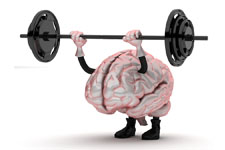An active brain is a healthy brain. The more everyday mental challenges you give your mind, the less likely it will be to decline into dementia. Scientists know more than ever about how to keep your grey matter better for longer
Exercise may improve thinking skills in people as young as 20. According to a new study, regular aerobic exercise such as walking, cycling or climbing stairs may improve thinking skills not only in older people but in young people as well.
The study published in the January 30, 2019, online issue of Neurology (the medical journal of the American Academy of Neurology) involved 132 people between the ages of 20 and 67.
The participants were non-smokers, did not have dementia and did not exercise much at the start of the study and were determined to have below average fitness levels.
Participants were randomly assigned to six months of either aerobic exercise or stretching and toning, four times a week. The two groups were equally balanced for age, sex, education as well as memory and thinking skills at the start of the study.
Regular aerobic exercise such as walking, cycling or climbing stairs may improve thinking skills not only in older people but in young people as well.
Participants’ thinking and memory skills were evaluated at the start of the study as well as at three months and at the end of the six month study.
Results showed that those who did aerobic exercise improved their overall scores on executive function tests by 0.50 points This was significantly different to those who did the stretching and toning who improved less by only 0.25 points.
Between the ages of 24 and 80 a typical brain’s weight decreases by about 20 per cent and blood flow to this vital organ decreases by the same amount. What’s more, our frontal lobe – the part of the brain that’s key to mental abilities – shrinks and we can experience changes in memory, problem-solving, decision-making and attention. Here are 10 proven ways you can help preserve your brain health
 Stay mentally challenged
Stay mentally challenged
Today’s research, published in the journal Neurology found that a lifetime spent challenge the brain through reading, writing and other brain-stimulating activities slowed the brain decline linked to dementia. 294 people over 55 were given tests that measured memory and thinking every year until they died.
Fascinatingly, the researchers looked at their brains after death looking for evidence of the physical signs fo dementia such as brain lesions and plaques. Those that maintained lives with the most brain stimulation – reading, writing and so on – had a 15 per cent slower rate of brain decline. So keep reading.
Increase brain ‘plasticity
Nothing to do with Tupperware, brain plasticity refers to the ease with which the neurons in our brains connect with one another and how the more they are used, the stronger they get. Neuroplasticity refers to the positive changes that can occur in the brain as a result of exposure to new experiences and learning opportunities.
Find your Calm Zone
‘The hormones produced by being under stress are bad for brain function,’ says Dr Jessica Grahn, research scientist specializing in brain health at the Medical Research Council. ‘Hormones such as adrenalin and cortisol are only meant to be released in short bursts, but over a longer period they start to have negative effects on concentration.’
Excessive cortisol can also damage the cells of the hippocampus, crippling our ability to learn, absorb and remember information.
Give-up multi-tasking
‘There are studies that specifically show multi-tasking doesn’t make us as efficient as we’d like to think it does,’ says Dr Grahn. ‘We often would have been much better off doing each of the tasks separately. If it’s two mindless activities such as listening to the radio while washing up, that’s probably fine, but if both tasks require a bit of thought, multitasking won’t help.’
Make ‘multisensory associations’
We use our eyesight and hearing the most, but smell, taste and touch are also powerful memory stimulators. The more you can use all your senses when you meet someone, the more likely their name – and the memory of the meeting – is to stay in your mind because you’ve made a ‘multisensory association’ with them. He suggests: Focus on the feel of their hand, is it rough, soft, cold, warm? What’s their smell? Are they wearing scent? Focus on their voice – is it deep or shrill?
HOW TO PROTECT YOUR BRAIN LONG-TERM
Eat Smart
Swedish researchers found that eating a wide range of fruit and vegetables (about 500 grams a day) in midlife has been associated with a reduced risk of Alzheimer’s and dementia 30 years later. Further studies have found that a high intake of carrots, cruciferous vegetables, citrus fruits and high-fibre breads were associated with increased cognitive function.
Eat Mediterranean
In general, a Mediterranean diet is a protective one when it comes to brain health. ‘In the US, researchers followed 3000 people for four years and found those with the highest intakes of olive oil, nuts, fish (both white and dark), tomatoes, poultry, vegetables, fruits and dark green leafy vegetables were protected against Alzheimer’s, especially where their diets were also associated with a lower intake of high fat dairy, red meat and butter,’ says Professor A.
David Smith, founding director of the Oxford Project to Investigate Memory and Ageing (OPTIMA) at Oxford University. ‘Our studies have also found that drinking unlimited amounts of tea, half a glass of red wine and a little bit of chocolate each day improved brain cognition,’ says Professor Smith.
Get your brain vits
The Oxford team also found that people with low vitamin B12 in their blood were six times more likely to experience the brain shrinking that is usually associated with old age, compared to those who had higher levels of the vitamin.
Find vitamin B12 in meat (especially liver), fish, shellfish, poultry, eggs, milk, yoghurt and fortified breakfast cereals. Folate is also important for the functioning of the brain. Find it in liver (especially calves’), baker’s yeast, green leafy vegetables, okra, lentils, black-eyed peas, baked beans, kidney beans, broccoli, eggs, tomatoes, bananas, fresh orange juice, and strawberries.
Check your blood pressure
‘High blood pressure in your 40s and 50sis a strong risk factor for the later development of Alzheimer’s and dementia,’ says Professor Smith. ‘But we also know that if you go to your doctor and have high blood pressure identified and treated, be that through medication or lifestyle or both, you can reduce your risk.’
Exercise
‘Aerobic exercise promotes greater connection between brain neurons,’ says Dr Grahn. ‘Our memories, skills and abilities depend on the making of new connections between these neurons.’ In studies on middle-aged adults who go brisk walking for 45 minutes three times a week compared to groups who only do stretching exercises, the walking groups showed improvements in brain activity and ability to maintain attention.
Editors’s note: Dr Grahn’s team has studied the effects of ‘brain training’ gadgets on 11,000 people and found they did not enhance people’s cognitive abilities.
More Healthista content:
6 proven ways to prevent dementia
13 ways to prevent dementia – the neuroscientist’s guide
25 surprising ways to improve your brain health
10 proven ways to lower your risk of Alzheimer’s
Like this article? Sign up to our newsletter to get more articles like this delivered straight to your inbox.




 Stay mentally challenged
Stay mentally challenged 


















































